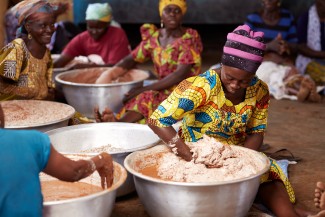“Coconuts are both culturally and economically important to Samoans,” says Alberta Vitale, Associate Director of Samoa’s Women in Business Development Incorporated (WIBDI).
This organisation was originally set up to create opportunities and a regular income for women in Samoa, but today, whole families are involved, helping to gather the coconuts and make coconut oil.
Samoa is a group of nine islands in the South Pacific. Coconuts have, for a very long time, played an important role in the local island economies. There may be as many as 85 words in the Samoan language referring to the tree or its parts.
However, things have been changing in the past few decades. While two-thirds of Samoans rely on agriculture and fishing for their income, the lure of lucrative urban jobs has more and more people moving away from agrarian lifestyles. Across the Pacific, both the rate of population growth and rate of urbanization is high, bringing social and infrastructural challenges.
Bolstering trade in a local and sustainable commodity, in this case coconuts may aid in addressing some of these challenges. “The coconut trade is helping our family stay in the village instead of moving to the city to find work,” says Luagalau Kelemete Lautafi, WIBDI organic certified grower and coconut oil producer.
With the growth, harvest and trade of coconut growing to be a billion-dollar global industry, largely due to a recent boom in consumption of organic health foods, “the time is right for Samoa to increase our supply of these products”, says Pulotu Lyndon Chu-Ling, CEO of Samoa’s Ministry of Commerce, Industry and Labour.
Through its Trade Sector Support Programme (TSSP), the Enhanced Integrated Framework has been helping a number of Samoan organisations work together to meet the booming global demand for coconuts and coconut products.
[image]
SEEING A FUTURE
The first hurdle to overcome was Samoa’s ageing coconut trees. Though resilient through volcanic activity and cyclones, they are nonetheless susceptible to the ravages of time.
“Many of the coconut trees in Samoa were planted 50 to 60 years ago and were well past their productive years,” says Patea Lilo Malo, CEO of the Samoa Trust Estates Corporation - a state-owned enterprise and the largest landowner in Samoa.
“This is why we started a replanting program: to revitalise this sector for the future.”
With the aid of an excavator to work the challenging but fertile volcanic soils, Samoa Trust Estates Corporation are planting 300 additional acres of both coconut and cocoa trees (having already planted 200 with the TSSP in 2016).
They are also employing village community groups to clear and maintain the plantations.
“Not only has this project helped us financially but it has also helped strengthen the bond among our youth group members and the community,” says Mafutaga Sio, a villager from Manono Tai.
[image]
ADDING VALUE
Selling raw coconuts at market is not the only way the industry can grow. Samoa has also been increasing its capacity to process its newly abundant raw resource.
WIBDI has been working in 183 Samoan villages, mainly with women smallholder producers, to nurture certified organic agricultural enterprises. Now, over 650 farmers across the islands have achieved organic certification, earning them SAT$600,000 (US$237,000) annually.
“For many, this means being able to send children to school, to pay bills and importantly, to have control over their lives instead of relying on remittances,” says Vitale.
They’re also building a new warehouse, which will enable raw materials like organic coconuts and cacao to be processed into higher-value exports like coconut oil, water, cocoa liquor, and chocolate in a certified food-safe environment. The warehouse will also provide proper storage space for products waiting to be shipped – important in a humid, wet environment.
The Scientific Research Organisation of Samoa has been advising WIBDI on which processing equipment to purchase, and carrying out experiments to both test for heavy metals such as Cadmium and optimize the quality of the processes (for example the optimum length of time for cocoa beans to be roasted).
[image]
Kuinimeri Finau, Assistant CEO of the Scientific Research Organisation of Samoa, says that these refined-in-Samoa products not only fetch a higher export value for farmers, they are easier to trade in light of quarantines and biosecurity measures with raw products.
The results are showing: Samoan products are being recognised by multinational brands, with the The Body Shop and C1Espresso touting their Fair Trade coconut oil and coffee partnerships with WIBDI on their websites.
“These partnerships with international brands have been invaluable in terms of stimulating the economies of the villages in which we work,” says Vitale.
The additional income gained from agriculture and processing provides locals with funding to maintain other traditional island crafts, such as fine mat weaving. In turn, these handicraft products can also be sold for extra income.
[image]
BUY SAMOA MADE
A number of these products have now been showcased in trade fairs across the Asia Pacific as part of a campaign to “Buy Samoa Made.” After of the launch of the campaign in New Zealand in 2013, total exports have increased by 11%.
“It’s amazing to think how far we’ve come since 2006, when the coconut and cacao industry was reasonably small,” says Chu-Ling.
“Sustainable Development is important and even more so, Development should be in line with Samoa’s values, culture and tradition,” says Vitale.
Coconuts, resilient, local and sustainable, seem to be the right place to start.
[image]
If you would like to reuse any material published here, please let us know by sending an email to EIF Communications: eifcommunications@wto.org.


